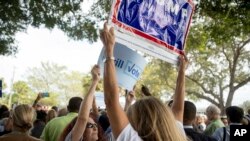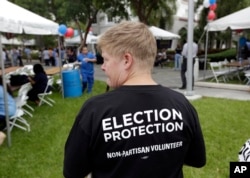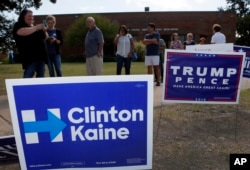Since Donald Trump has suggested he may contest the results of a “rigged” presidential election, worries that such rhetoric could inspire Election Day violence has prompted many government officials throughout the United States to prepare for that possibility.
The Republican presidential nominee’s calls to his supporters to serve as volunteer “poll watchers,” presumably in areas where a big vote is expected for his opponent, Hillary Clinton, also has aroused concerns about possible Election Day violence. At the same time, recent court rulings have sharply reduced the number of special election observers the federal government can dispatch to polling places to watch for any voter intimidation.
A recent opinion poll by USA Today and Suffolk University found that 51 percent of likely voters are concerned about outbreaks of violence next month, and that nearly half of that group said they are “very concerned.”
One concerned voter is Richard Darling, who lives in a suburb of the city of Detroit, Michigan. Darling says half of the entire U.S. population “will feel threatened” if Trump wins the presidential election; he believes there are that many recipients of government entitlements or illegal immigrants, who might expect a crackdown by Trump if he wins the White House.
Stocking up on ammunition
“There could be uprisings in that case, and if there are, I want to be able to protect myself," Darling told VOA. "So ... that’s why I’m stocking up on more ammunition for my weapons, just in case I have to protect my family and others around me."
A former U.S. congressman, Joe Walsh, seemed to fuel that sentiment when he took to Twitter this week: “On November 8th, I’m voting for Trump. On November 9th, if Trump loses, I’m grabbing for my musket. You in?”
Walsh said later that the musket reference was a metaphor, meaning that voters should express their dissatisfaction through acts of civil disobedience.
Kentucky Governor Matt Bevin has suggested that bloodshed would be "necessary" to "reclaim" the country if Democratic candidate Hillary Clinton becomes president.
“Whose blood will be shed? It may be that of those in this room," Bevin said while speaking at an event in Washington last month. "It might be that of our children and grandchildren. I have nine children. It breaks my heart to think that it might be their blood that is needed to redeem something, to reclaim something that we, through our apathy and indifference, have given away."
More school closings than usual
In the midst of the contentious national political debate, election officials across the U.S. are on high alert. Although many public schools are normally closed on Election Day and used as polling places, school boards have ordered the closure of other classroom centers where no voting is taking place, or they have asked election officials to relocate their polling stations.
In Denver, in the western state of Colorado, Election Day readiness plans have included training poll workers how to respond to "active shooter" situations.
“We did add an active shooter training module for all of our field workers and all of our election judges, even those who are inside the building in our central office,” said Amber McReynolds, director of the Denver Elections Division, in an interview with VOA.
McReynolds said the additional training was provided because “we want our teams to be prepared should anything, any emergency situations, arise.” She added that election officials will be in regular contact with city police to ensure citizens have a safe voting experience.
The U.S. Election Assistance Commission, a small government agency, told VOA it is collaborating with local election officials to “ensure the continuity, security and integrity of elections in America.” Contingency planning recommendations include the establishment of alternate polling locations in the event of an evacuation and the preparation of a list of at least five worst-case scenarios.
There is no federal law that governs the postponement of elections, but the commission said some states have statutes permitting such action in certain situations.
The U.S. Justice Department and the FBI say they will be ready to respond to any violent outbreaks at the polls by placing monitors at select polling places. A centralized command post at FBI headquarters in Washington will monitor any threats reported throughout the U.S.
In addition to FBI personnel, the command post will be manned by Justice Department and Homeland Security Department authorities to “ensure that allegations relating to violations of federal criminal law and security threats to the election are appropriately handled.”
FBI agents serving as Election Crime Coordinators will also be on duty at the agency’s 56 field offices throughout the U.S.






